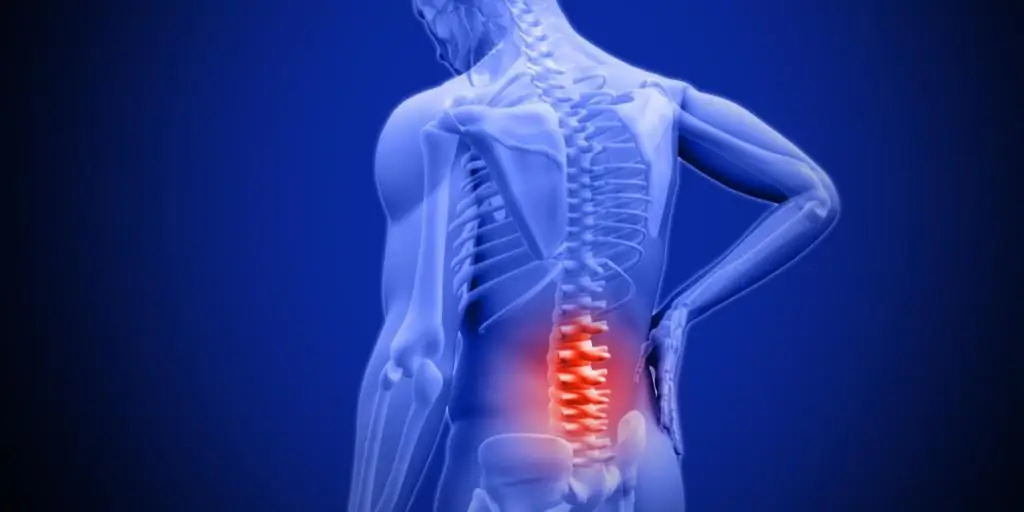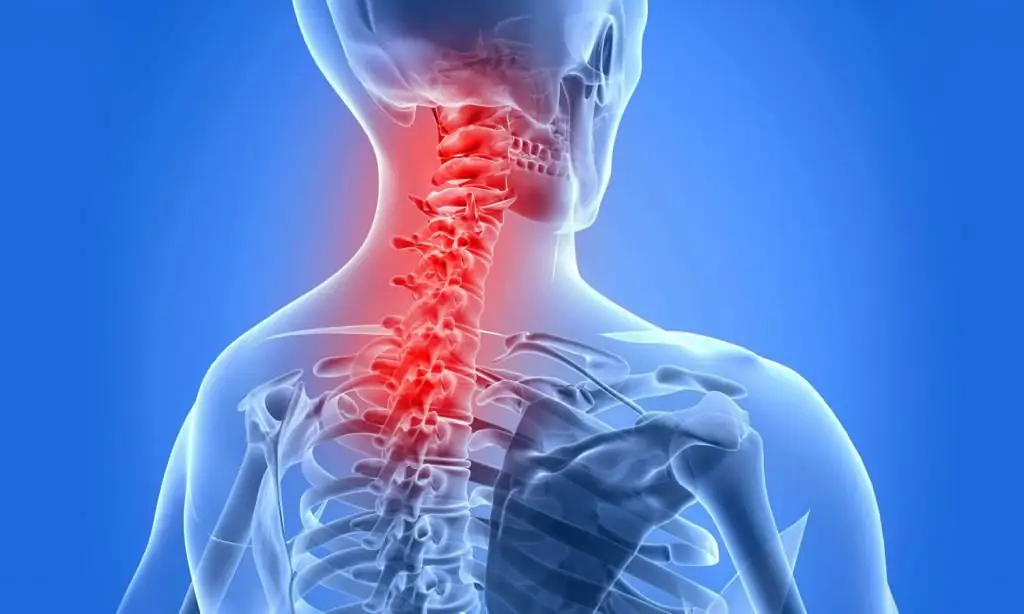- Author Curtis Blomfield blomfield@medicinehelpful.com.
- Public 2023-12-16 20:44.
- Last modified 2025-01-23 17:01.
Candles "Loksidol" - anti-inflammatory nonsteroidal antirheumatic drug. Meloxicam, present in its composition, is a derivative of enolic acid and belongs to the category of anti-inflammatory non-steroidal substances, has a pronounced analgesic, anti-inflammatory and antipyretic effect. The mechanism of its work is due to the ability to inhibit the biological synthesis of prostaglandins, which are mediators of inflammation as a result of selective inhibition of COX-2.

What can you learn from the instructions for candles "Loksidol"?
Composition of the drug
This pharmacological agent is produced in the form of suppositories for rectal use. The composition of one suppository includes the active element - meloxicam 15 mg, and additional substances: solid fat and macrogolglyceryl hydroxystearate.
Pharmacokinetics
Absorption parameters are similar tooral forms of the drug. The maximum plasma concentration is observed 6 hours after the administration of the suppository rectally.
The main active element of candles "Loksidol" binds very well with plasma proteins, mainly with albumin (98%). It is able to penetrate the synovial fluid, the concentration of which is approximately 50% of the plasma level. The main substance is completely metabolized in the liver with the formation of four inactive derivatives. The main metabolite is 5'-carboxymeloxicam, which is formed due to the oxidation of intermediate metabolites, 5'-hydroxymethylmeloxicam, which is also excreted, only to a lesser extent. The drug is excreted from the body in equal amounts with urine and feces, mainly in the form of metabolites. Approximately 5% of the daily dose is excreted unchanged through the intestines, trace amounts are found in the urine in the medical preparation.
The average half-life of the active element is 19 hours. Plasma clearance - 8 ml / min. In elderly patients, this figure is somewhat lower. Pharmacokinetic parameters in liver or kidney failure do not change.
Indications for use
Indications for the use of candles "Loksidol" are described in detail in the instructions.
This medication is used for the symptomatic treatment of pain in diseases such as osteoarthritis (arthrosis, degenerative joint damage), ankylosing spondylitis, rheumatoidarthritis.
Dosing and administration regimen
Candles "Loksidol" are administered rectally, once a day (15 mg of meloxicam). The likelihood of side effects depends on the dosage and duration of use. The drug should be used for the shortest possible time. The highest allowed dosage per day is 15 mg.

Side effects
Candles "Loksidol" can provoke the development of the following negative reactions of the body:
- digestive disorders, vomiting, nausea, abdominal pain, constipation, flatulence, development of diarrhea;
- gastrointestinal bleeding, perforation and severe ulceration, especially in elderly patients;
- anemia, thrombocytopenia, leukopenia, agranulocytosis, especially in cases of simultaneous use of methotrexate;
- itching, skin rashes;
- photosensitivity reactions, Stevens-Johnson syndrome and epidermal toxic necrolysis, urticaria, blistering dermatitis, angioedema;
- anaphylactoid or anaphylactic reactions;
- asthma attacks, especially in people allergic to aspirin or other non-steroidal anti-inflammatory drugs;
- feeling drunk, headaches, dizziness, drowsiness, ringing in the ears, disorientation, confusion;
- puffiness;
- high blood pressure, palpitations, hot flashes;
- temporary increase in bilirubin or transaminase levels;
- changekidney functionality (increased concentration of creatinine or urea in the blood), rarely - acute renal failure;
- hepatitis;
- visual impairment.
Contraindications
According to the instructions for candles "Loksidol", the conditions in which the use of this medication is contraindicated are:
- hypersensitivity to the main element of the drug or to additional substances;
- with cross-sensitivity to aspirin and other NSAIDs;
- History of gastrointestinal bleeding or perforations associated with NSAIDs;
- peptic ulcer in the acute stage;
- severe liver failure;
- renal failure (unless hemodialysis is available);
- GI bleeding, cerebrovascular or any other bleeding;
- chronic or complex acute heart failure;
- having a history of proctitis or rectal bleeding;
- under 15;
- lactation, pregnancy.
Drug Interactions
Other NSAIDs, including salicylates: the simultaneous use of more than one of these drugs significantly increases the risk of ulcers in the digestive tract and gastrointestinal bleeding as a result of synergistic effects. The combined use of meloxicam and other NSAIDs is not recommended.
Antiplatelet agents, anticoagulants, systemic heparin, thrombolytic drugs: increasethe likelihood of bleeding. In cases where it is impossible to avoid the concomitant use of these drugs, it is necessary to monitor the anticoagulant effect.
Lithium: the agent increases the concentration of lithium in plasma due to a decrease in its renal excretion. The combined use of lithium and NSAIDs is prohibited. If such a combined treatment is necessary, control the level of lithium in plasma at the beginning of therapy, when selecting the dosage and canceling the drug "Loksidol".

"Methotrexate": NSAIDs can reduce the tubular secretion of this drug and thus increase the level of methotrexate in plasma. If complex therapy is necessary, it is necessary to control the properties of blood and kidney function. Some care must be taken when NSAIDs and methotrexate are used simultaneously for three days, since the concentration of methotrexate in the blood can increase significantly, resulting in a variety of toxic reactions.
"Cyclosporin": NSAIDs, acting on renal prostaglandins, can increase the toxicity of cyclosporine to the kidneys. In the case of complex therapy with the use of these drugs, kidney function should be monitored.
Intrauterine contraceptives: "Loksidol" reduces the effect of intrauterine contraceptives.
Diuretics: The use of this pharmacological drug with diuretics at the same time increases the likelihood of developing acute renal failure in patients with dehydration. Patients who takemeloxicam and diuretics at the same time, should receive a large amount of liquid. Before starting therapy, an examination of kidney function is necessary.
Antihypertensive drugs (eg, angiotensin-converting enzyme inhibitors, beta-blockers, vasodilators) Loxidol reduces the effectiveness of antihypertensive drugs by inhibiting prostaglandins, which have a vasodilatory effect.
"Cholestyramine": significantly enhances the excretion of meloxicam as a result of its binding in the digestive tract.
Instructions for candles "Loksidol" in gynecology will be presented below.

Special Recommendations
The use of the drug, like other NSAIDs, requires strict monitoring of patients with a history of diseases of the digestive system, as well as patients taking anticoagulant medications. NSAIDs suppress the production of renal prostaglandins, which are necessary to maintain blood flow in the kidneys. In patients with reduced renal blood flow, the use of this drug may cause the development of renal failure, which disappears after discontinuation of the drug. In patients with moderately pronounced changes in kidney function, the dosage of the drug can not be changed, but constant monitoring of kidney function is necessary. In rare cases, the drug "Loksidol" can lead to interstitial nephritis, renal medullary necrosis and glomerulonephritis, or to the development of symptomsnephrotic syndrome. The following categories of patients are prone to such complications:
- with chronic kidney failure;
- people who underwent major surgery (which provoked hypovolemia);
- cirrhosis patients.
As indicated by the instructions for use for "Loxidol", a pharmacological agent, when used together with diuretics, can increase the retention of potassium, sodium and water in the body and affect the natriuretic efficacy of diuretic drugs, as a result of which predisposed patients may experience or worsening heart failure or hypertension.
Medication is given with some caution to debilitated patients, the elderly, and those with heart failure.
What else does the instructions for use for candles "Loksidol" tell us? The drug, like any other NSAID, can lubricate the symptoms of the underlying infectious pathology. Like other medicines that inhibit the production of COX / prostaglandins, Loksidol can disrupt the fertilization process, so it is not recommended for women planning pregnancy.
Features of the impact of this drug on the ability to drive a vehicle or dangerous mechanisms is that when using the medication, various negative reactions from the central nervous system may occur, which is why it is necessary to control the above technical devices ontreatment period to refuse.
Instructions for use for "Loksidol" must be strictly observed.

Use in gynecology
This anti-inflammatory drug, due to its properties, is currently widely used in clinical gynecology in the event of the following infectious diseases and the accompanying pain syndrome:
- adnexitis;
- endometritis;
- cervicitis;
- colpitis;
- salpingoophoritis;
- other inflammatory processes in the female reproductive organs that cause severe pain.
According to reviews, candles "Loksidol" in gynecology are considered effective, because they quickly help get rid of the pathology.

Analogues
The list of analogues of this pharmacological preparation is quite large. Some of these medications are:
- "Amelotex" - a drug that belongs to the pharmacological category of anti-inflammatory non-steroidal drugs, catalyzes the production of prostaglandins. Due to selectivity, the main substance blocks COX-2, due to which the anti-inflammatory effectiveness of this agent and a minimal damaging effect on the mucous membranes of the digestive organs are observed.
- "Zeloxim" - NSAIDs, the absolute analogue of "Loksidol", a selective inhibitor of COX-2. It can be categorized as oxicam because it is a derivative of enolic acid. Rendersanalgesic, anti-inflammatory and antipyretic effects. The mechanism of influence is associated with a decrease in the biosynthesis of prostaglandins due to inhibition of the enzyme activity of COX.
- "Melox" - in composition and pharmacological properties is similar to the drug in question. Blocks prostaglandins, has an anti-inflammatory, analgesic effect.
Reviews about the drug
The drug "Loksidol" is considered one of the most prescribed medicines among non-steroidal anti-inflammatory drugs, which are produced in the dosage form - suppositories. There are a lot of reviews about this remedy, which is due to the wide scope of this medical product. It is used to eliminate the pain syndrome caused by a wide variety of diseases of an infectious nature - the field of neurology, traumatology, urology, gynecology, etc. Patients say in reviews of candles "Loksidol" that the tool helps to quickly get rid of unbearable pain when other drugs are used they don't help.

The drug is used mainly to relieve pain in the development of diseases of the bones and joints, however, patients who used it for other pathologies also noted its high effectiveness.
Candles "Loksidol" in gynecology are often prescribed to women with the development of inflammatory processes in the small pelvis, for example, with adnexitis. Patients observed that after the introduction of the suppository, the pain passed quickly, however, there were somenegative side effects.
Severe nausea, dizziness, stool disorders in the form of diarrhea are most often observed among the side effects. Many of the patients who left feedback on this drug had significantly pronounced negative reactions, in which they had to stop using the drug "Loksidol" and replace it with analogues.
We reviewed the instructions and reviews for candles "Loksidol". In gynecology, their use is also described.






